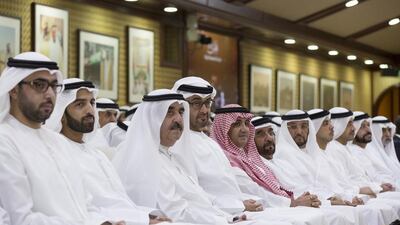ABU DHABI // Parents must carefully plan the amount of time their children spend in front of television and “fast-pace” media, a leading paediatrics specialist said on Monday night.
Dr Dimitri Christakis of the University of Washington addressed the Ramadan majlis of Sheikh Mohammed bin Zayed, Crown Prince of Abu Dhabi and Deputy Supreme Commander of the Armed Forces.
Dr Christakis said that children who watched too much television early in life faced higher risks of attention deficit hyperactivity disorder, but those who were given regular cognitive stimulation developed a greater ability to focus.
He said that the brain experienced its greatest growth in the first three years of life, tripling in size from about 300 grams it weighed at birth. Therefore, the early experiences that the brain absorbed were critical.
Not all TV and interactive media were bad for children, Dr Christakis said, but they should stay away from interactive media such as fast-paced video games, during the first two years of life.
Dr Hawaa Al Mansouri, deputy head of Imperial College London Diabetes Centre, who moderated the discussion, said people in the UAE spent an average of 7.5 hours a day watching TV, while 8.8 million were active internet users.
Those figures were “higher than the UK and Germany”, Dr Al Mansouri said.
Dr Christakis said a study conducted by the University of Sharjah found that the number of people with ADHD in the UAE had risen by 30 per cent in the past two decades.
He advised parents to have “a very clear plan” about how they would moderate their children’s use of the TV and the internet, and encouraged them to become more involved.
Parents can define if their child is more sensitive to media exposure affecting their attention span if the youngster is drawn to, for example, playing video games for hours.
“We would say that at 18 months of age, interactive media at a reasonable pace is OK,” Dr Christakis said. “This does not include Skyping relatives.”
He suggested that parents keep a media diary for a week to evaluate the useful hours from non-useful ones spent.
“Do we want our child to spend 15 hours on Facebook?” Dr Christakis asked. “Facebook’s strategy is that each human should spend three hours a day on it. It is their target.
“So ask yourself, ‘is this what I want?’ And if not, start building limits now.”
Developing self-control at an early age also affects how successful the child grows up to be, he said.
Dr Christakis referred to a study conducted 30 years ago at Stanford University, in which children were given a marshmallow and told if they waited a certain amount of time before eating it, they would be given more.
Only a few of the children waited but researchers found that “the longer the children waited to bite that marshmallow, the better they did in school and life”, said Dr Christakis.
The majlis was attended by Sheikh Mohammed, and Sheikh Saud bin Rashid Al Mualla, Ruler of Umm Al Quwain.
hdajani@thenational.ae


